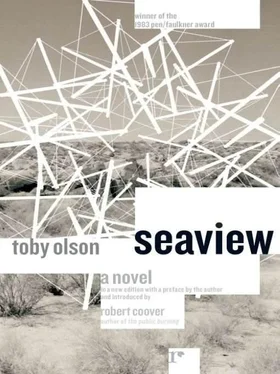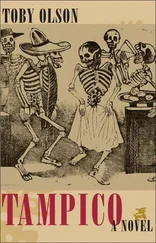Though he was buzzing a little from the drugs he had taken, he was in no way distracted, and seeing his work and its results brought things into an even clearer focus. He got down on his belly and sighted across to where the apron met the green, a blade of grass tickling his nose. “One little place,” he said aloud as he studied the slopes and contours leading into the manicured sur — face of shorter grass that was the collar and then onto the green itself. He reached into his pocket and took out a new golf ball, a Club Special, and placed it just in front of his nose, sighting along it to a small pine in the rough beyond the green. The spot in question lay on that line, and he marked it before he rose. He went to the mower and took a small trowel out of a canvas bag that hung from the seat. He returned to the golf ball, where it stood up, white and shining, and sighted down the line again. Then he crawled on his stomach along the line and to the questionable spot. When he got there he saw that some miscreant weeds had stuck their arrogant spiked heads up through the body of his work, and he shook a finger at them as he rose up to his knees. “This is it for you, little nasty fuckers,” he said, and began scratching and digging, moving bits of grass, weed, and dirt with his special little trowel.
FRANK BUMPUS KNEW THE TOURNAMENT WOULD BEGIN at twelve-thirty, and he wanted to be back at the clubhouse for it. That is, he wanted to be sure to be there when the men began to gather, wanted Chair Fredricks, especially, to see him. He had worked hard to appear as an annoyance that was both harmless and very visible, and he knew that today would be a good one in which to push the plan. When the time came, such P.R. considerations would be important. Public opinion and visibility, the way the press would pick him up as a somewhat colorful fellow, would give a kind of power of its own. He figured he could get some work done before the tournament, so when he finished his coffee he left his mug on the edge of the park bench next to Sammy, said good day, and set out across the eighth fairway toward his home.
He lived in a beach shack tucked in the dunes near the cliff above the ocean. The shack had no water or electricity, and often the sand would drift against it as high as its windows and cover its porch, and he would have to shovel it out. Still, he had plenty of wood and a good stove, his people would carry water in for him from a jeep they parked on the beach, and though he was in his mid-seventies, he was very tough and in good health. He had lived in the shack for twelve years, ever since he had come back to the Cape (where he had been raised to manhood) as an organizer for his brother Pamets, and he attributed his good health in part to the Spartan existence he felt the shack afforded him. And there were other things he liked about the spot as well. The outer beach that he could see from his small porch was the one that Henry David Thoreau had walked and written about. He had read the book, and he thought that Henry David Thoreau had a good, if tight, sensi-bility and a way of seeing which was valuable. A mile or so out to sea was the place of numerous shipwrecks over the cent-uries. He had read about them, and he had a map on his wall showing the shapes of the ships, their place of sinking, and their names, countries, and dates. It warmed him to know that his ancestors had found good use for materials washed up from these shipwrecks.
It was hard to find a book that had much to do with his people out here. Massasoit’s Profile Rock was little more than a tourist attraction, and when the great King Philip appeared in a text, he was only presented in the extremity of his heroic final acts. But Bumpus felt the presence of the ancestors in the white man’s history books. He was only a mile or so from Corn Hill and equal distance from the waters by which the white man had first camped when he came here. He felt his people’s bones under the ground. His favorite thing to read was the beginning chapters of History of Plimouth Plantation. This place was mentioned in the first few pages of that text. He liked the clarity of William Bradford’s prose, though he had been a limited and too earnest man. In his own slow and quiet battle, Bumpus liked to think that his rather awkward adversaries could at least be traced back to William Bradford as their ancestor and that the terms of the struggle had been defined in Bradford’s terms, by worthy men. He felt this gave some dignity to what he was involved in beyond the justice of the claim.
And there were men at the golf course, though not the ones he had engaged with, who gave him heart and respect for his foe. These were the Portuguese and Yankee fishermen, many of whom were now retired from the sea to golf. They were men of substance, and he liked to imagine them and himself as young men, as children, as embryos, and finally as ancestors. Back there they could have fought well against each other, killing each other as they might. Often he thought he could see these kinds of shards of racial identity in their eyes as he spoke to them on the links.
He entered his home and walked past his desk to a corner of the room where sat a table, a stoneware pitcher, and a bowl. He poured some water into the bowl, took up a sliver of soap, and washed his hands and dried them on a towel that hung on a nail driven into the wall. Then he went to his desk, sat down, and took a folder from the top of a large pile that rested there. On the tab of the folder, typed in, were the words: Franklin M. Fredricks, CPA, Log/Correspondence . Inside the folder, stapled to the inside cover, was a piece of lined yellow legal paper containing a calendar of phone calls and correspondence dates. Most of the papers in the folder were carbons of letters and transcriptions of phone calls. He ran a thin finger down the calendar. “Letter today, Saturday; phone call Monday,” he thought. He put the folder aside and turned in his swivel chair to the typewriter that sat on the short part of the L of his desk. In this position he could see out the front window of the shack. A pair of male goldfinches were pecking at the tube of the thistlefeeder that hung from a two-by-four rig stuck in the sand.
“Hi, boys,” Frank Bumpus said. “There’s a bobwhite coming soon,” and then he began to type.
THE CHAIR HAD PICKED OUT A PAIR OF WHITE COTTON pants with little boats on them. The boats were set a good three inches apart, so there was no mistaking that the pants were white. They had no cuffs and were double-stitched with kelly-green thread down the outer seams. On the wide belt loops, fragments of the little boats could be made out. The boats were toylike, and each of them floated on a curl of wave that was equal to their length and about a quarter-inch deep. The waves were a few thin lines of green and blue, with the white of the background showing through. The boats seemed not to be located in any clear pattern; some were at right angles with the leg, but some were set askew, and a couple were almost upside down. Their hulls were dark green, and they had bright red masts that were topped with orange sails. They did not seem seaworthy. Each one had a small porthole with crosshatched lines in its side, and each had a little pink rudder, and a pink point at its prow.
At five places on the legs there were five little whales. They were the same size as the boats, and they too floated on little waves. They were pink in color, with curvy tales, and they each spouted a curl of water from their blowholes. They each had a little eye and little green lines for smiles. Near the slit of both front pockets, but not printed in a symmetrical way, there were two dolphins. These were the same size and general shape as the whales, and only their color (they were blue) seemed to distinguish them. But at a closer look, which the Chair had taken before buying the pants, one could see that the dolphins, though they sat on similar waves, had no blowholes or curls of spout, and they were not, like the whales, riding the waves but were arched in mid-dive, halfway between the exit from one wave and the entrance into another. They didn’t seem to have any pupils in their happy eyes.
Читать дальше












